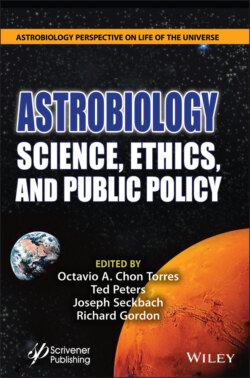Читать книгу Astrobiology - Группа авторов - Страница 24
2.2.1 First Foundational Question: Who Are We?
ОглавлениеHow do we ground our ethics when we earthlings are looking at the sky? By grounding I mean justifying. Ethics, as the theory underlying moral action, cannot simply ride the winds of whim or personal preference. Its foundation needs to be cemented down. How are we going to do this?
We can begin the planting process by asking three fundamental questions: Who are we? What do we value? What should we do? Let us address each of these in turn; and then we will address the issues already on our list.
Who are we? Evolution has made us into responders. According to theologian H. Richard Niebuhr, responsibility ethics is grounded in human nature. “What is implicit in the idea of responsibility is the image of man-the-answerer, man engaged in dialogue, man acting in response to action upon him” [2.54]. An astroethics of responsibility could be grounded in the responsive trait belonging to our human nature.
Who are we? By we here I mean the entire human race on planet Earth. Inherent in asking about astroethics for earthlings is the question: Who speaks for Earth? [2.83]. How could we justify a moral agent that does not build on responsibility to humanity and of humanity in the form of a single planetary society?
A single planetary society becomes a community of moral deliberation when addressing the relationship between Earth and what is off-Earth. Our solar neighborhood or the Milky Way metropolis is not the private property of one nation; nor is an off-Earth site the claim of whichever team of astronauts arrives first. The competition and rivalry that plague our everyday territorial claims on Earth must be superseded by a global community about to enter the space environment which surrounds all of us.
This single Earth community does not exist yet, even though the United Nations has been working with this concept of the we at least since 1967. The 1967 UN Treaty on Principles Governing the Activities of States in the Exploration and Use of Outer Space, Including the Moon and Other Celestial Bodies, stipulated: “§ 1. The exploration and use of outer space, including the moon and other celestial bodies, shall be carried out for the benefit and in the interest of all countries, irrespective of their degree of economic or scientific development, and shall be the province of all mankind. § 2. Outer space, including the moon and other celestial bodies, shall be free for exploration and use by all States without discrimination of any kind, on a basis of equality and in accordance with international law, and there shall be free access to all areas of celestial bodies” [2.85]. After looking toward the heavens, we earthlings look back at each other and recognize a newly founded unity. Octavio Chon-Torres notes: “The treaty of outer space is a good example of how our expansion in the Universe should help us to conceive [of] ourselves as a united humankind” [2.13].
Our first moral responsibility is to work toward the establishment of a single planetary society, which may in time become expanded into a galactic moral community. Here is the warrant: virtually every decision regarding what earthlings do in space will have repercussions for every resident of Earth. Therefore, the concept of planetary ethics includes, among other things, representative participation. We can envision a future replete with a single universal humanity; and we can incarnate that vision proleptically by acting now out of that vision. Our first obligation is to become who we are: the one people of Earth, diverse in the past but united in the future.
